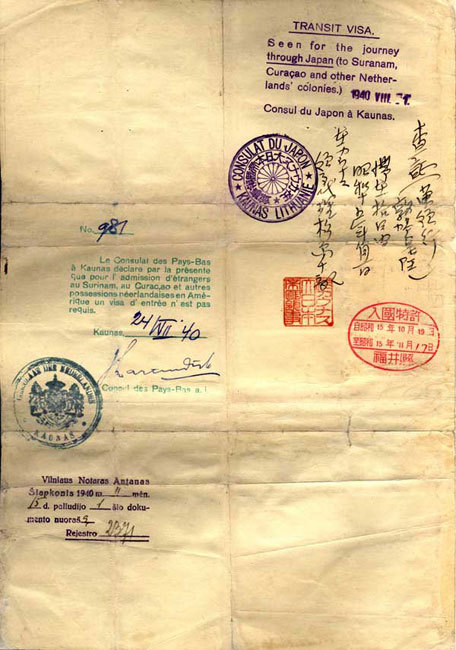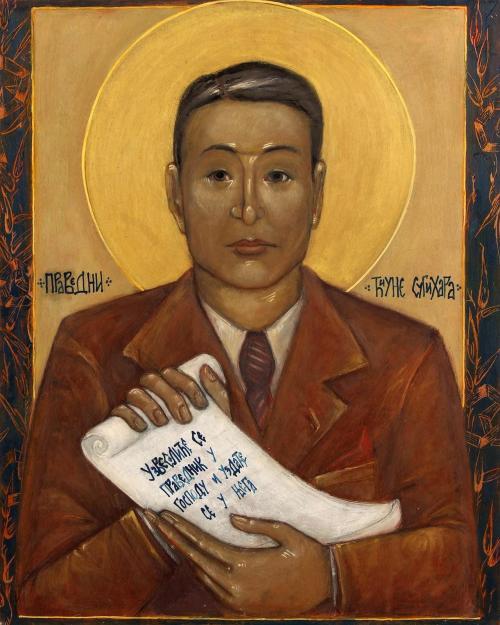peashooter85:The Japanese Schindler — The Story of Chiune SugiharaIn the early days of World War II,
peashooter85:The Japanese Schindler — The Story of Chiune SugiharaIn the early days of World War II, Chiune Sugihara was a Japanese diplomat who served as ambassador to Lithuania. At the time, the German Third Reich had just steamrolled Poland and France, while Hitler’s “final solution” was morphing from a plan to reality. The Soviet Union had also invaded and occupied Lithuania, so it was only a matter of time before the Japanese consulate in Lithuania was closed, with Sugihara being reassigned elsewhere.With Germany expanding its power from the west, hundreds of thousands of Jewish refugees tried to escape east to avoid German persecution. Thousands of those refugees stopped at the Japanese consulate in hopes of being issued a travel visa through the Soviet Union. The Soviets permitted Jewish refugees to travel through the USSR, but only if they were issued a legal travel visa by a sponsoring government. However, obtaining a visa was next to impossible. The Japanese government itself imposed so many conditions on the issuing of the visas that few if any of the refugees could ever be issued one. After talking the situation through with his wife and family, Sugihara decided that he would ignore the official regulations, an act which could result in imprisonment or execution, and try to save as many people as he could.In late July of 1940 the Soviet government ordered all foreign embassies to leave its territory by the 31st, but Sugihara successfully petitioned for a 28 day extension. He then began issuing travel visas to anyone who requested them, contrary to Japanese regulations. Racing against the clock, for the next 28 days, between July 31st and August 28th, Sugihara went on a travel visa blitz, occupying all of his time to issue visas. He worked 18-20 hour days doing nothing but issuing travel visas, most of which involves filling out forms by hand. Due to his dedication, a month’s worth of travel visas were issued to refugees on a daily basis, typically around 300 a day. He worked so fervently that his wife would feed him sandwiches by hand, and massage his wrists, back, and muscles which ached from the fervent work. Time ran out on August 28th, but Sugihara continued to stall for time. Finally on September 1st, he was ordered to leave his post. As he left the consulate he continued to issuing documents while on the move, even from a train window as he was leaving. He then flung out of the moving train his remaining Japanese government stationary and official consulate stamp while shouting, “Please forgive me. I cannot write anymore. I wish you the best.”Despite openly disobeying orders, Sugihara’s actions largely went unnoticed by the Japanese Government until after the war. During the war Sugihara served as consulate in Berlin, Prague, Konigsberg, and Bucharest. When the Soviets occupied Romania at the end of the war, him and his family were arrested by Soviet officials and forced to spend 18 months in a POW camp. When he returned to Japan in 1946, he was forced to resign his position, and was blackballed by the Japanese government. To support his family, he worked a series of menial jobs, at one point selling lightbulbs door to door. He then spent 16 years working in the Soviet Union while his family lived in Japan. In 1985 he was awarded the Righteous Among the Nations Award, an Israeli honor issued to gentiles who worked to save Jews during the Holocaust. He is the only Japanese citizen to be awarded the title. He died in 1986, at the age of 86.Later investigation into Japanese consulate records found that Chiune Sugihara personally issued around 6,000 visas between July 31st and the closing of the consulate. Each visa was good for an entire family, and it is estimated that he rescued around 20,000 - 40,000 people. Most would make it to Japan safely, where they would then travel to China, Australia, New Zealand, Canada, the United States, and Palestine. -- source link
Tumblr Blog : peashooter85.tumblr.com


